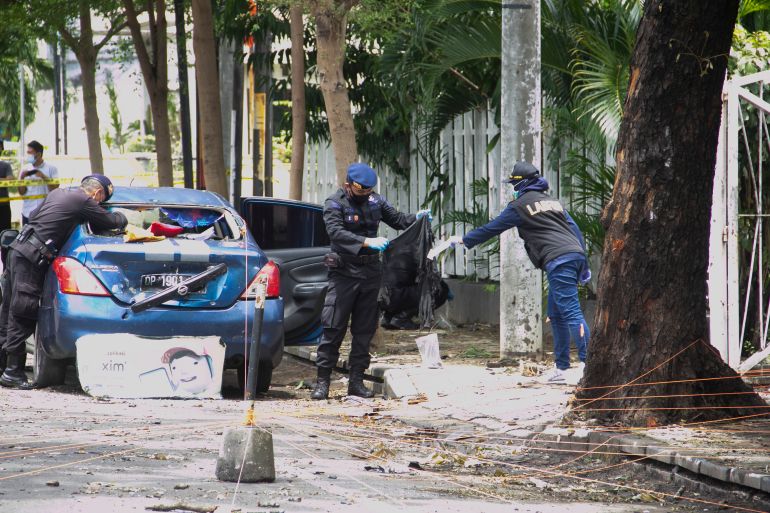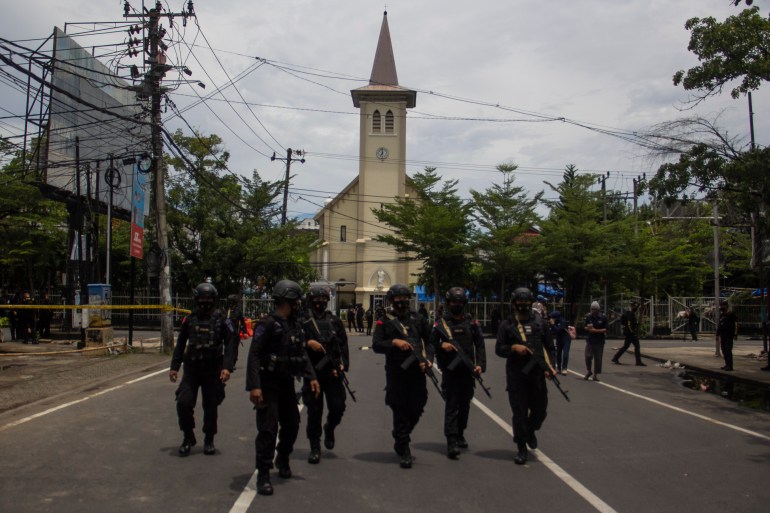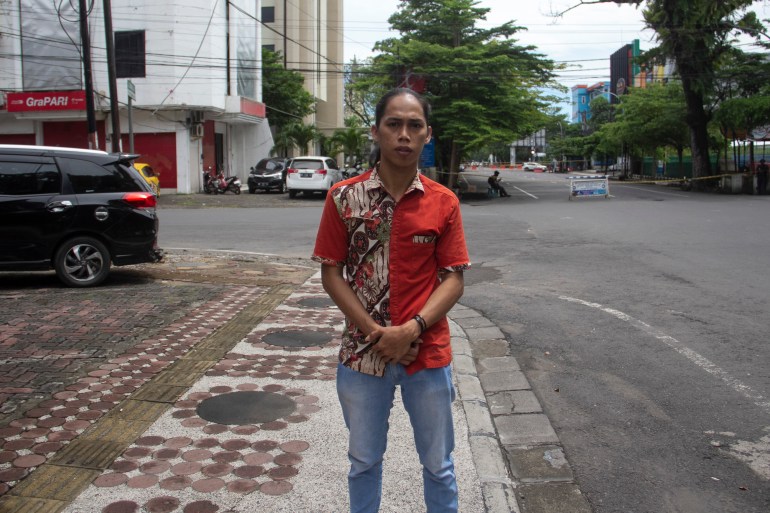Makassar Palm Sunday bomber was known to Indonesian police
Experts say Indonesian authorities should pay compensation if perpetrator confirmed as one of hardline group arrested in January.

Makassar and Medan, Indonesia – Indonesia’s National Police have said a suicide bomber who attacked a church in the country’s northeast on Sunday was known to them.
The police said on Sunday that the male suicide bomber, who attacked the Sacred Heart of Jesus Cathedral in Makassar on the island of Sulawesi on Palm Sunday had already been identified because of a previous arrest.
Keep reading
list of 4 itemsSuicide attack targets Indonesia church
Indonesian schoolgirls ‘bullied’ into religious clothing: Report
Indonesia courts controversy with private COVID vaccine scheme
“The person concerned is part of a group of several perpetrators who we arrested some time ago. This group is part of, or is related to, groups that carried out operations in Jolo in the Philippines,” National Police Chief Listyo Sigit Prabowo told a press conference.
“We have the initials of the perpetrator and we are following up. We are doing DNA tests to make sure that we’re being scientifically responsible.”
Prabowo said that the male perpetrator and his wife, who had been married for seven months, had both died in the blast outside the cathedral.
“We arrested approximately 20 people from Jamaah Ansharut Daulah (JAD). They are part of [the group]. The data we have matches,” he added.

In January 2021, 20 members of JAD, a hardline group, were arrested in Makassar, on suspicion of planning attacks in Indonesia.
JAD is affiliated with the ISIL (ISIS) group and, in addition to carrying out twin bombings in Jolo in the Philippines in 2019 which left 20 dead, the group also attacked three other churches in Surabaya in Indonesia, killing 28 including the suicide bombers in 2018.
Asked during the press conference why the perpetrator of the Makassar cathedral attack was arrested and then released in January, Prabowo said: “We always see whether there is evidence, physical evidence and other things, […] investigation and further investigation are considerations of course, decided by the investigating officers. Of course, we are continuing to follow this up.”
Al Jazeera has repeatedly reached out to the Public Affairs Department of the National Police to clarify whether the attacker was previously in custody and released, or simply affiliated with the group detained in January but has not received a reply.
Possible motivation
Ian Wilson, a senior lecturer in Politics and Security Studies at Murdoch University in the Australian city of Perth, told Al Jazeera that the attacker’s possible previous arrest, or the arrests of other members of the JAD group, may provide an insight into his motivation.
“It’s possible that if the bomber had already been detained by the police, but then released, this experience may have pushed him to hastily carry out an attack, particularly with many of his fellow travellers already arrested. It could have been as a statement of solidarity or revenge, or as a desperate act done under the assumption that he could soon be joining them in prison,” he said.
“This would explain the poor organisation, planning and execution of the attack which appeared rushed and done without planning or logistical support. It is unclear at this point what role his wife of just seven months may have played, if any, in the preparation for the attack. Fortunately this all conspired to confine the fatalities to the two bombers.”
The police confirmed that a crude pressure cooker bomb device, which had been filled with nails, was used in the Makassar attack. In addition to the deaths of the perpetrators, 19 others were injured and four remain in intensive care.
Yosi, 29, who works at the Pelangi Cafe near the blast and goes by one name, told Al Jazeera that he heard an explosion and immediately ran towards the scene where a plume of smoke was rising and a strong smell filled the air.
“It smelled sour, I think because of the bomb materials, but there was a fishy smell too, maybe because the smoke was mixed with someone’s blood,” he said.
Yosi said that he saw body parts on the ground. Four people close to the scene were bleeding, including a middle-aged woman with a wound to the forehead, Yosi said. He helped her onto a passing motorbike so she could be taken to hospital for treatment.
Compensation for victims
Ranto Sibarani, a human rights lawyer based in Medan, told Al Jazeera that the Indonesian government has a legal responsibility to compensate the victims of the attack if the police had released the suspect from custody prematurely.
“Having scrutinised the statement from the National Police at the press conference, we can assume that the perpetrator was one of the 20 JAD members arrested back in January,” he told Al Jazeera.

“It appears from the statement that he was released because of lack of evidence. However, under Indonesia’s anti-terrorism laws, the police have the power to detain anyone while they investigate in order to protect the populace from terrorist attacks.”
Indonesia’s Anti-Terrorism Law was drafted in 2003 a year after the Bali bombing, which killed 202 people, and was revised in 2018 in the wake of the Surabaya church attacks. It now allows the authorities to hold suspects for up to 200 days during the investigation process compared with 60 days for other crimes.
“Cases like the Makassar attack pose a risk to the entire population of Indonesia and we need to be clear that we will not just arrest the perpetrators who commit these atrocities, but will also work on behalf of the victims as well,” said Sibarani.
“To disincentivise suicide bombings, the government should pay compensation to the victims in cases like this which will serve a dual purpose. It will show that the government is taking responsibility for keeping people safe and also assert pressure on the terrorists who will not want to commit these acts knowing that they are making ‘infidels’ and their families rich in the process.”